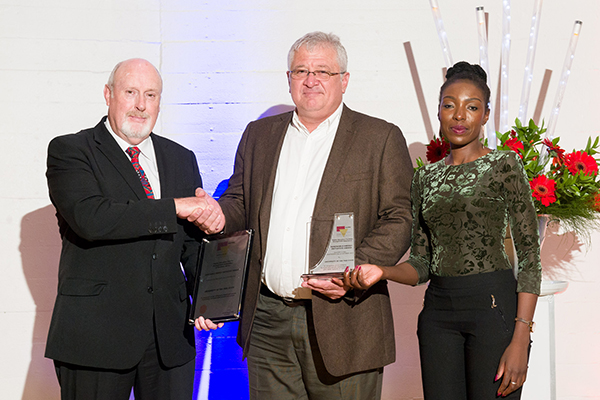
Marcel Theron, Former President: HEFMA; Nico van Rensburg, Senior Director:
University Estates (UFS); and Maureen Khati, Project Manager: Facilities
Planning (UFS) attending the HEFMA awards ceremony in Pretoria.
Photo: Supplied
University Estates at the University of the Free State (UFS) were recently awarded for their amazing initiative to install and operate photovoltaic (PV) and greywater systems on all three of its campuses. They were awarded by the Higher Education Facilities Management Association of Southern Africa (HEFMA), an association of facilities managers operating in the higher-education sector in the Southern African region. All universities and universities of technology in the country form part of this association, which promotes excellence in the planning, construction, maintenance, operations, and administration of educational facilities.
Nico van Rensburg, Senior Director of University Estates, says, “I want to thank HEFMA for this amazing award which motivates for much more and also opens up the doors for so many more opportunities.”
Solar and greywater systems installed at various buildings
In December 2016, 26 solar-driven LED street-light poles and a greywater system were installed at the Legae Residence on the South Campus. Greywater is made up of bath, shower, and bathroom sink water. The water is reused for toilet flushing, as well as for irrigation purposes.
On the Bloemfontein and Qwaqwa Campuses, the computer laboratories as well as the Thakaneng Bridge Student Centre and the expected Afromontane Research Centre have freestanding solar solutions mounted on their roofs. These systems are designed to operate independently of the power grid (Eskom) during sunlight hours when the PV solar panels are heated by the sun.
Teamwork equals ground-breaking results
“This was truly a team effort with a variety of role players who contributed,” says Van Rensburg. He believes that higher education can do more to make use of other environmentally sustainable initiatives, and to go beyond just erecting and renovating buildings.
The UFS executive management is also extremely proud of the team that were involved in the project. Prof Nicky Morgan, former Vice-Rector: Operations, says, “It’s been extraordinary what we could achieve at all three campuses with such a small team.” Nadeem Gafieldien, Director: Property Services at Stellenbosch University, showered the UFS with praise. “This is truly ground-breaking for Higher Education (HE) and you are truly leaders in these renewable energy projects in the HE sector.” He says we need to demonstrate to other institutions in the HE sector that this is the future and that it makes the institutions both environmentally and financially sustainable.